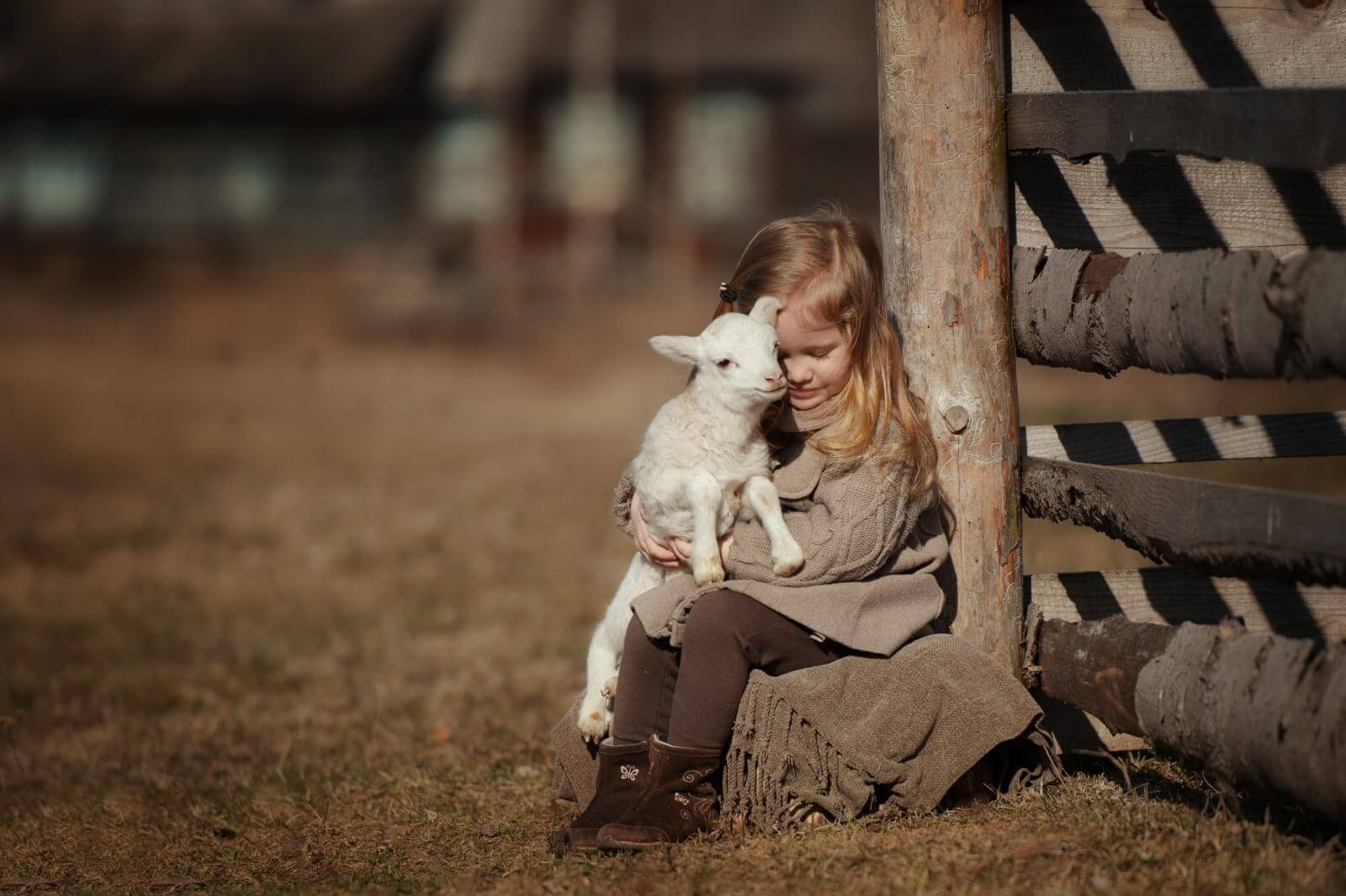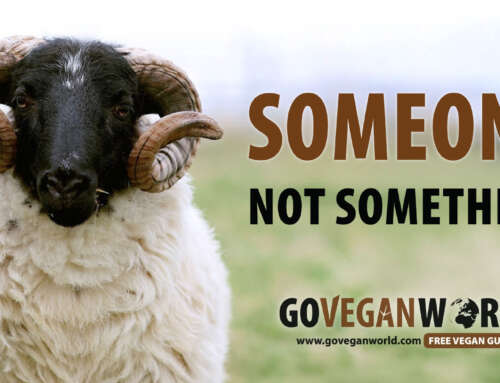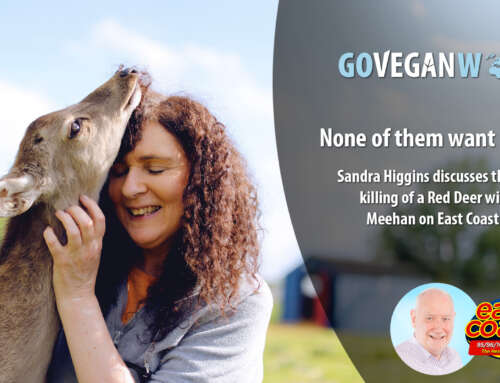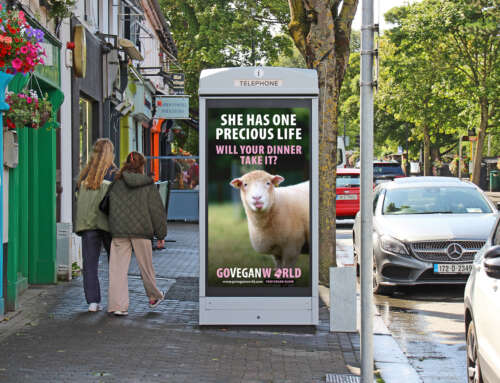Right to Education That is Respectful of Veganism / Animal Rights
Vegan parents have the right to have their children educated in a way that does not conflict with their vegan convictions. The government or State has a duty to respect that right throughout the education process, yet most vegan children are being taught in a way that undermines the vegan conviction that other animals have the rights to their own lives, not to be used as the property of another, and not to be killed.
Children of vegans are taught throughout our standard education system that animals are things, “livestock”, “beef” etc, production units, here to be used and killed by us to satisfy our desires. People involved in the animal-using industries are invited into our schools to speak to our children about their businesses and promote their products. Children are told that we need to use and kill other animals to survive, informed (incorrectly) that we cannot obtain all the nutrients we need on a plant diet, and are not infrequently ridiculed for their moral convictions, not only by other pupils but by teachers, other teaching staff and visiting business people.
There is an almost complete absence of any objectivity, critical examination, or diversity of viewpoints on this subject in education. The fact that many people believe that it is morally wrong to use and kill other animals is rarely acknowledged in standard education. That people rejected animal use and killing thousands of years ago, that the modern animal rights movement dates back to at least the 1940’s, that there are hundreds of thousands of people living and thriving on a fully plant-based diet in the UK and Ireland alone, is entirely absent from the standard curriculum.
Children are essentially being indoctrinated into believing that animal use and killing is morally right, “normal”, “natural” and necessary. The parental human right to an education for their children that respects their moral convictions exists to defend against indoctrination and to ensure that equal respect is given to minority convictions. We need to use this right to challenge the attempt to indoctrinate our children and to promote diversity, critical examination and objectivity throughout the education process and the standard curriculum, in relation to animal use.
In the paragraphs that follow we set out in more detail the right to education. We then list examples of situations and curriculum content that may be subject to challenge.
In order to make these challenges we need to know about current situations that are in breach of the right to education. Please contact us to let us know of situations like this, giving us details of the curriculum content or activity, the impact on you and/or your child, and, if you objected or sought to secure an alternative, and how the education provider responded. You can contact us at Barbara.bolton@goveganworld.com The information you provide will be very useful to our ongoing work to use the law to advance veganism and thereby animal rights.
Thank you in advance for your support.
The Right to Education
When the state or government is educating children they must ensure that “education and teaching is in conformity with [the parents’] philosophical convictions.”[1] We know from previous European human rights decisions that the vegan conviction that it is wrong to use and kill other animals is recognised as a protected philosophical conviction, and so vegan parents have the right to have their children educated in conformity with that.
This doesn’t mean that we can challenge any suggestion in our education system that it is morally acceptable to use and kill other animals, but it does mean that we can challenge indoctrination, and demand that education is delivered in an “objective, critical and pluralistic” way, taking account of and giving equal respect to different viewpoints.
The most well-known instance of a challenge based on this parental right is the case of Campbell and Cosans v The UK, in which two Scottish mothers challenged the use of corporal punishment (physical violence) against children in school, as being contrary to their philosophical conviction that physical violence should not be used against children. The decision in that case led to the abolition of corporal punishment in the UK and Ireland.
The European Court of Human Rights (“ECtHR”) agreed that the mothers’ conviction that it was wrong to inflict physical violence on children was a protected conviction, with the same protections as apply to religious beliefs. The fact that punishment was not part of the core curriculum did not matter, as the right to an education that conforms with fundamental convictions applies to the whole education process, including activities that might be said to be “ancillary” to teaching.
The ECtHR has since clarified the extent of the parental right in other decisions. It has pointed out that: “The government must “respect parents’ convictions, be they religious or philosophical, throughout the entire State education programme.”[2]
This does not mean that parents can object to the teaching of a philosophy other than their own. The court noted that the right:
“does not prevent States from imparting through teaching or education information or knowledge of a directly or indirectly religious or philosophical kind. It does not even permit parents to object to the integration of such teaching or education in the school curriculum, for otherwise all institutionalised teaching would run the risk of proving impracticable.”
In other words, as it’s going to be impossible for all educational content to reflect the philosophical convictions of everyone at the same time, there has to be a limit to the parental right and scope for the government to teach the dominant philosophy. However, education following the majority viewpoint can lead to abuse of the dominant position, a failure to give fair and proper respect to minority perspectives, and to indoctrination, and this must be countered, which is why the parental right exists.
The right to education in conformity with parental convictions means that the government has to ensure that when they teach a particular philosophy or outlook, they do so in an “objective, critical and pluralistic manner,” meaning they must recognise there are alternative viewpoints, give equal respect to minority convictions, and avoid presenting the dominant view uncritically. The court said:
“the State…must take care that information or knowledge included in the curriculum is conveyed in an objective, critical and pluralistic manner. The State is forbidden to pursue an aim of indoctrination that might be considered as not respecting parents’ religious and philosophical convictions. That is the limit that must not be exceeded.”
The UK courts have acknowledged these decisions and upheld this interpretation of the right to education, confirming the requirements not to indoctrinate, to teach in an “objective, critical and pluralistic” manner, to give equal respect to minority philosophical convictions and to behave in a neutral and impartial way in delivering education.[3]
What Can Be Challenged?
The following are examples of things that may be subject to challenge, depending on the circumstances, on the basis of the parental right to education:
- teaching about animal use in an uncritical way;
- teaching about animal use in a way that fails to acknowledge a diversity of viewpoints;
- teaching about animal use in a way that is not objective, i.e. where those doing the teaching show bias;
- teaching in a way that seeks to indoctrinate;
- teaching in a way that fails to give equal respect to vegan convictions as to the non-vegan position;
- teaching about animal use in a sanitised way that presents an inaccurate picture of how we use animals, perhaps omitting the fact that animals are killed, or presenting that in a benign way, and other factual inaccuracies and omissions;
- teaching using materials prepared by those involved in animal-using businesses, for example if a local dairy company provides a school with materials that are then used to teach;
- promoting animal products in schools, for example free or reduced-price cow’s milk;
- inviting people into schools who use animals, for example butchers, farmers who use animals for “dairy”, “meat”, eggs or “fish”, to talk to pupils;
- visits to places where animals are used, such as “meat”, “dairy”, egg or “fish” “farms;”
- visits to places where animals are kept in captivity, such as zoos;
- teaching about food and nutrition in a way that does not acknowledge up-to- date dietetics advice regarding the nutritional adequacy of a fully plant-based diet;
- failing to include animal rights and veganism in classes covering moral education;
- using live animals in education, for example “chick hatching projects” or “classroom pets;”
- direct school participation in using animals for food, for example where schools have animals on school grounds who are looked after, including by pupils, before being sent to be killed;
- dissection of animals;
- experimentation on animals;
- failure or refusal to provide alternatives to animal products for cooking and other classes;
- undermining the vegan philosophical conviction.
In some cases, the appropriate remedy may include allowing vegan parents to have their children removed from certain activities and be provided with a suitable, equivalent, alternative. In many cases, however, exclusion may not be an appropriate or adequate remedy. Whether or not there has been a breach, and what the appropriate remedy will be, will depend on the circumstances.
It should be noted that although we have discussed here using the parental right to education to challenge these situations, in many cases they may also breach the child’s own human rights under the Convention on the Rights of the Child. Children have their own right to live according to their conscience and their moral convictions, and to have those convictions respected including in education.[4]
In addition, the education of all children must be directed to: “development of respect for human rights and fundamental freedoms” and “for the child’s parents, his or her own cultural identity, language and values”; “preparation of the child for responsible life in a free society, in the spirit of understanding, peace, tolerance, equality of sexes, and friendship among all peoples”; and “the development of respect for the natural environment.”[5]
What You Can Do
Please let us know if you encounter examples of these situations, providing as much detail as possible and including copies of relevant course materials where possible. We will not attribute any information to you without firstly obtaining your express written consent, by email or otherwise. Please send all relevant information to barbara.bolton@goveganworld.com
The information you provide will be very useful to our ongoing work to use the law to advance veganism and thereby animal rights.
Thank you in advance for your support.
[1] This is the wording in Article 2(2) of Protocol 1 of the European Convention on Human Rights; a similar right is contained in Article 18(4) of the International Convention on Civil and Political Rights.
[2] Kjeldsen, Busk Madsen and Pedersen v Denmark
[3] Fox, Bielby, Wellsted and Reid v Secretary of State for Education, 2017
[4] Convention on Rights of the Child Art 14.
[5] Art 29(1).






